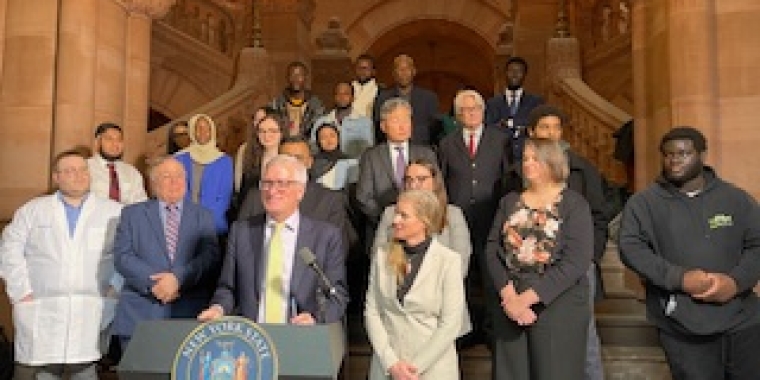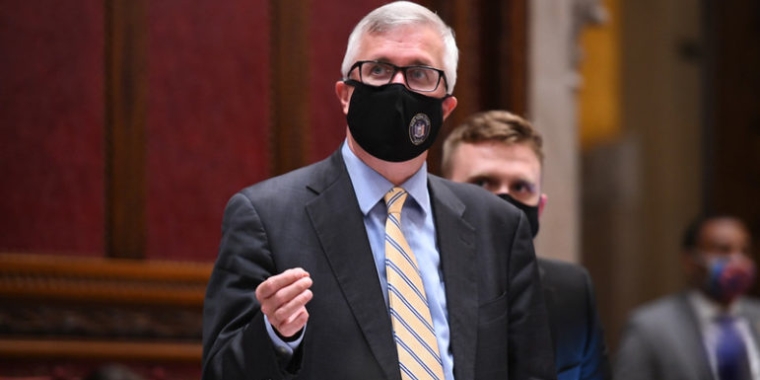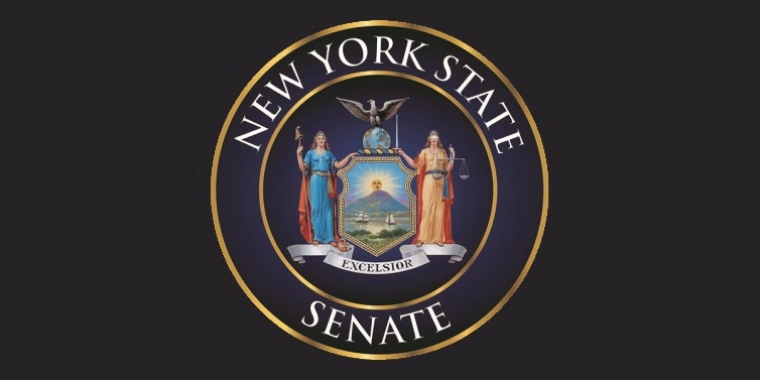
Senator Kavanagh and Assemblymember Kelles introduce bills to protect New Yorkers from dangerous food additives—known and unknown

Senator Kavanagh & Assemblymember Kelles Introduce Food Additives Bills
ALBANY—State Senator Brian Kavanagh and Assemblymember Dr. Anna Kelles today announced the introduction of two pieces of legislation aimed at protecting New Yorkers from dangerous additives—known and unknown—used in foods and beverages.
The first bill, A6424A/S6055B, would prohibit the use of seven dangerous and unnecessary additives in foods or drinks sold in New York state: azodicarbonamide, brominated vegetable oil (BVO), butylated hydroxyanisole (BHA), potassium bromate, propylparaben, Red 3, and titanium dioxide. All but BHA are banned in the European Union; the state of California last year enacted legislation to eliminate BVO, potassium bromate, propylparaben, and Red 3 from foods and drinks sold in that state by 2027. New York’s prohibition would take effect in 2025.
The second bill, S08615/A9295, would require companies to disclose to the state of New York when they add chemicals to foods and drinks that the company secretly self-determines are “generally recognized as safe,” or GRAS without notifying the FDA. While the FDA does approve a small fraction of new food chemicals, it does not require premarket approval, notice, or its own safety review for the vast majority of chemicals, which instead are self-determined as GRAS by the food companies who use them. These GRAS determinations currently can be conducted in secret by experts or employees paid by the companies, without notifying FDA or the public.
Supporters of both bills, which include the Center for Science in the Public Interest, Interfaith Public Health Network, NYS American Academy of Pediatrics, Clean+Healthy, Consumer Reports, Environmental Working Group, and others, say the bills close gaps left open by the FDA. The FDA eliminated the synthetic dye Red 3 from cosmetics and topical drugs in the 1990s when it learned it caused cancer when eaten by laboratory animals, yet it is still allowed to be used in food and oral drugs. And because companies are not required to notify the FDA when introducing new food chemicals, the agency is often unable to assess a chemical’s safety until after a problem is identified. For instance, the 2022 recall of Daily Harvest vegetarian “Crumbles,” which sickened at least 393 people and hospitalized at least 133, led to an investigation which identified tara protein flour as a possible cause—a new ingredient for which the FDA had no advance notice and had not approved for use in food.
“New Yorkers deserve the highest level of protection when it comes to the safety of the food we eat,” said Senator Kavanagh. “State law has long included the authority to regulate what goes into our food, but New York has generally deferred to the federal government; such deference is not warranted with respect to these seven additives, which pose significant health risks. Nor should we defer to the secrecy of the federal process regarding new chemicals that food companies add to our food without any public disclosure or review by the FDA. This legislation will ensure transparency and permit public scrutiny of food chemical safety. I thank Assemblymember Kelles for her partnership and expertise, as well as CSPI, Consumer Reports, EWG, Clean & Healthy NY, the American Academy of Pediatrics, the Council of Churches, and everyone who is joining us in this fight to protect the health and wellbeing of all New Yorkers."
“For too long, the FDA has failed to take action to protect consumers from toxic chemicals found in our food,” said Assemblymember Kelles. “I am proud to sponsor legislation to ban seven of these additives that are linked to serious adverse health effects, like DNA damage, heart and thyroid toxicity, and reproductive harm. We also must close a loophole that allows food and chemical companies to irresponsibly bypass FDA approval for new food additives. My legislation would take out the secret of GRAS by requiring industry to notify New York of their GRAS determinations that have not been reviewed by the FDA.”
Like the legislation enacted in California banning the use of four food additives, the New York bill banning seven dangerous additives would reverberate far beyond the state’s borders: Food manufacturers complying with it may well implement the changes nationwide. Such bills are also likely providing an incentive to officials at the FDA to catch up to the states and eliminate the chemicals’ use in food nationwide.
The second New York bill, requiring disclosure of chemicals not disclosed to FDA, would also have nationwide impact, according to CSPI.
“These bills would introduce the most important reforms to the U.S. food chemical review process in decades,” said CSPI regulatory counsel Jensen Jose. “Not only can the state of New York ban harmful additives, it can shed new light on the chemical safety decisions the food industry currently makes in secret by making these safety decisions accessible to everyone.”
“These two bills will increase transparency and protect consumers from toxic chemicals in New York's food supply," said Environmental Working Group policy director Jessica Hernandez. "Without federal action, it's up to states like New York to keep us safe from additives linked to health harms in the foods we eat and feed our families. EWG applauds Senator Kavanagh and Assemblymember Kelles for their efforts to protect public health.”
“The FDA’s system for ensuring that food additives are safe is broken,” said Consumer Reports director of food safety Brian Ronholm. “For too long, the FDA has been unable to keep up with the latest research documenting that some chemicals allowed in food pose unacceptable risks to our health. These bills will protect the public and help fill the regulatory gap by banning certain harmful food additives and requiring greater transparency from manufacturers when they introduce new chemicals in food products without FDA review.”
“The faith communities we work with are very concerned about the harmful chemical additives often found in ultra-processed foods,” said Interfaith Public Health Network convener Bob Pezzolesi. “They especially worry about the long-term health effects on children, and the inequitable impacts on communities of color and rural communities living in poverty. We are grateful to Senator Kavanagh and Assemblymember Kelles for their leadership in both removing several of these harmful chemicals from New York’s food supply and ensuring more transparency from food manufacturers.”
“The toxic compounds that would be banned by this legislation have been linked to cancer and can harm the reproductive, thyroid and nervous systems,” said Charles Moon, MD, Co-Chair of the New York State Chapter 3 Committee on Environmental Health and Climate Change, New York State American Academy of Pediatrics. “We must protect the health of all New Yorkers and especially children by removing these additives from our food supply. We can also improve transparency, accountability, and trust with communities by having New York State more closely monitor food additives that have not been reviewed by the FDA. This is common sense public health and food safety legislation that pediatricians fully support.”
# # #



